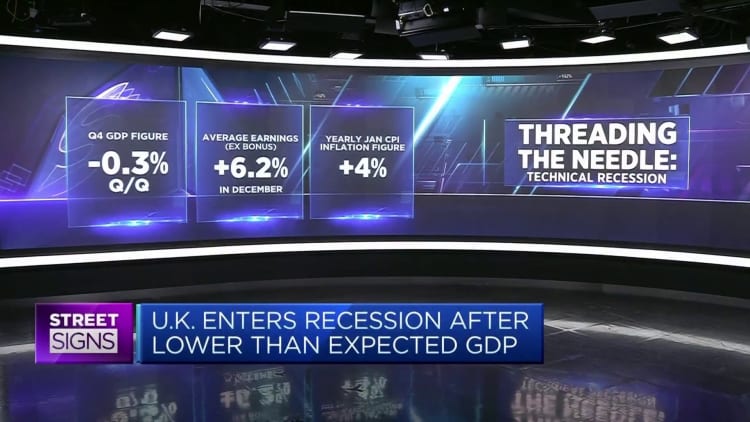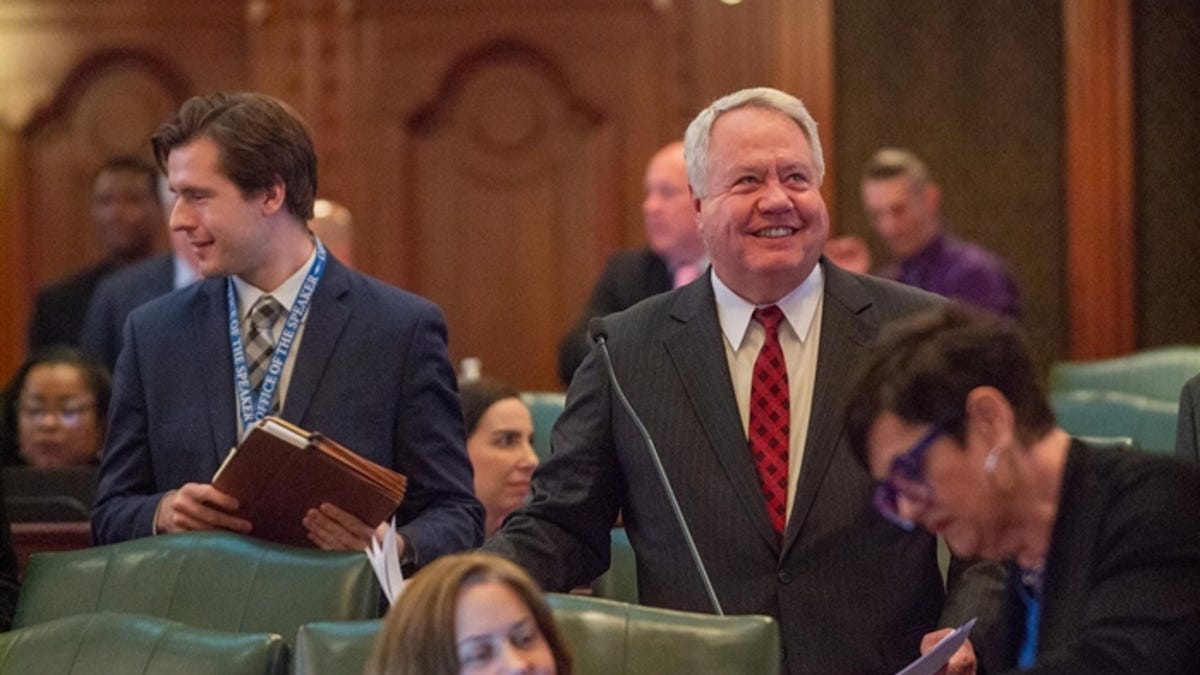Finance
'Last chance saloon': UK finance minister expected to pledge pre-election tax cuts

British Finance Minister Jeremy Hunt said earlier this month the U.K. would not enter a recession this year.
Hannah Mckay | Reuters
LONDON â Economists expect U.K. Finance Minister Jeremy Hunt to use a small fiscal windfall to deliver a modest package of tax cuts at his Spring Budget on Wednesday.
Heading into what will likely be the Conservative government’s last fiscal event before the country’s upcoming General Election, Hunt is under pressure to offer a sweetener to voters as his party trails the main opposition Labour Party by more than 20 points across all national polls.
But he must also navigate the constraints of fragile public finances and a stagnant economy that recently entered a modest technical recession.
On the upside, inflation has fallen faster than anticipated and market expectations for interest rates are well below where they were going into Hunt’s Autumn Statement in November.
The Treasury pre-announced plans over the weekend to deliver up to £1.8 billion ($2.3 billion) worth of benefits by boosting public sector productivity, including releasing police time for more frontline work.
The Independent Office for Budget Responsibility estimates that returning to levels of pre-pandemic productivity could save the Treasury up to £20 billion per year.
Hunt will also announce £360 million in funding to boost research and development (R&D) and manufacturing projects across the life sciences, automotive and aerospace sectors, the Treasury said Monday.
However, the big questions over tax cuts remain heading into Wednesday’s statement.
Increased fiscal headroom
“On balance, we think Chancellor Hunt’s fiscal headroom will have likely increased â but only marginally, and nowhere close to what he had in the Autumn Statement (owing largely to the fall in expected debt costs),” Deutsche Bank Senior Economist Sanjay Raja said in a research note Thursday.
The German lender estimates that the government’s fiscal headroom will have grown from around £13 billion to around £18.5 billion, and that tax cuts are “very likely” the first port of call. Raja suggested the finance minister will err on the side of caution in loosening fiscal policy, favoring supply side support over boosting demand.
“Supply side measures are more likely in our view, particularly with the Bank of England more amenable to loosening monetary policy,” Raja said.
“Therefore, tax cuts to national insurance contributions (NICs) and changes to child benefits are more likely to come in the Spring Budget (in contrast to earlier expectations of income tax cuts).”
A substantial cut to National Insurance was the highlight of Hunt’s Autumn Statement, though economists were quick to point out that its benefit to payers would be more than erased by the effect of existing freezes on personal income tax thresholds â known as the “fiscal drag.”
The U.K. National Insurance is a tax on workers’ income and employers’ profits to pay for state social security benefits, including the state pension.
Raja also suggested an extension of the government’s existing freeze on fuel duty remains a possibility, and that some spending cuts will likely be used to partially offset a loosening of fiscal policy.
In total, Deutsche Bank expects Hunt to deliver net loosening of £15 billion over the coming fiscal year, dropping to around £12.5 billion in the medium-term.
“The outlook for the public finances remains precarious. Slight changes to the macroeconomic outlook could result in big shifts to the public finances. The Chancellor continues to walk a fine line between managing his fiscal rules now and rising austerity later,” Raja said.
“To be sure, big questions on the public finances remain â including whether spending cuts, or limited rises in some areas, remain realistic to tackle the rising strain in public services, and the Government’s own ambitions around net-zero, defence, and overseas development spending.”
BNP Paribas economists expect a more modest package of tax cuts worth around £10 billion across the 2024/25 fiscal year, and projected that the government will start the year with a fiscal windfall of around £11 billion.

The French bank agreed that the reductions will be aimed at stimulating labor supply, with “little impact on inflation and thus the Bank of England.”
“Our base case is that the government will spend GBP10bn of the near-term fiscal windfall and use the additional medium-term fiscal space to cut personal taxes,” economists Matthew Swannell and Dani Stoilova said in a research note entitled “last-chance saloon.”
They also expect the Treasury to postpone the March 2024 rise in fuel duty for another 12 months, at a cost of £3.7 billion a year, and to introduce a permanent 1 pence reduction in the basic rate of income tax at a cost of between £6 billion and £7.35 billion per year.
“The overall effect of this policy package would be to leave medium-term fiscal headroom roughly back where it started at GBP12.7bn,” they added.
“With the Conservative party trailing in the opinion polls and the Budget possibly the last opportunity to loosen fiscal policy before a general election, we expect Chancellor Hunt to once again, at least, spend any additional fiscal space available to him.”

Finance
Wisconsin groups support next generation of STEM workers | Finance & Commerce

MILWAUKEE — Contractors, utilities and public officials this week had something to offer to local students interested in construction and science, technology, engineering and mathematics (STEM).
The construction labor shortage and age gap are continuing conversations in the industry and drives more contractors to find ways to add to the labor pool. In March, there were around 295,000 construction jobs open across the U.S, according to preliminary data from the U.S. Bureau of Labor Statistics. The median age in the construction field is 41.9, BLS data showed.
Meanwhile, different groups this week awarded scholarships, recognition and partnerships to schools and students interested in construction and STEM fields. One partnership between contractors and a school will create a new learning laboratory at a Wauwatosa high school, officials said. Here’s what groups did this week to support the next generation.
Plumbing and mechanical contractors partner with Wauwatosa schools
Wauwatosa East High School has partnered with mechanical contractors JM Brennan and TOTAL Mechanical, manufacturer representative Air Flow, the Milwaukee and Southeastern Wisconsin Plumbing and Mechanical Contractors Association and Sheetmetal and Air Conditioning Contractors Association to develop a learning laboratory to prepare the next building and construction trades labor force, officials said.
The partners will further develop the HVAC part of the technical training space at Wauwatosa East.
“At Tosa East we are very proud of our program,” said Craig Griffie, the technical education teacher at Wauwatosa East. “The students are building a really strong foundation and it’s all due to the partners we have.”
State awards “fab lab” grants to 18 school districts
Gov. Tony Evers and Missy Hughes, secretary of the Wisconsin Economic Development Corp., awarded $493,000 in “fab lab” grants to 18 school districts to train students in science, technology, engineering, arts and mathematics. The money is used to help create fabrication labs at local schools and equip them with computerized manufacturing machines such as 3D printers and laser engravers.
Lawmakers recognize national construction contest winners
State Rep. Clint Moses and Brian Westrate, staff for U.S. Representative Derrick Van Orden, recognized the University of Wisconsin-Stout construction team, faculty and staff. The team clinched a gold medal in estimating at the Associated Builders and Contractors National Craft Competition held this year in Kissimmee, Florida.
Madison utility awards high school scholarships
Madison-based Alliant Energy awarded scholarships worth $1,000 to 25 high school seniors in Iowa and Wisconsin. The scholarships are awarded to students who perform community service work, academic achievement and wrote an essay about community problems solved through science, technology, engineering or mathematical concepts.
Julie Bauer, executive director of the Alliant Energy Foundation, said “supporting workforce readiness and fostering young minds interested in STEM-based careers is critical to developing the future of a skilled and innovative workforce.”
Finance
Faegre Drinker Grows Dallas Finance & Restructuring Practice

Glenn Reitman has joined Faegre Drinker as a partner in the finance & restructuring practice in Dallas, the firm said Thursday.
Reitman represents lenders and borrowers in structuring, negotiating, and documenting finance transactions, according to Faegre Drinker. He has particular expertise with commercial, real estate, and energy projects and structured financing.
His finance practice includes private equity, venture capital, leveraged buyouts, structured products, loan workouts, and restructurings, said the firm.
This story was produced by Bloomberg Law Automation.
Finance
What will the finance team of the future look like – Accountancy Age

Author
Date published
May 2, 2024
Categories
A significant part of the work we do at AICPA & CIMA is about looking at trends within the profession and using them to discern what the future of accounting looks like, so as to best prepare our members to thrive within it.
This is the rationale behind our Future of Finance 2.0 project, of which we have just released the latest iteration. This paper highlights and explores what I think is the most significant long-term trend which is currently reshaping the accounting and finance profession, and it essentially relates to mindset.
In the past, it would be fair to characterise our profession as being quite rigid and rules based. This is not intended to be derogatory, it is simply a reflection of the work we did and the career paths we followed to do it. What we are seeing today, and will see more of in the future, is a shift towards a more expansive mindset, with value-creation at its heart.
Our work will incorporate a wider range of responsibilities, including but not limited to being the stewards of sustainability data and strategy and working with colleagues in all parts of the of organisations we serve to drive efficiency, productivity and sustainable value creation.
Sustainability
Sustainability is one of the key drivers of change within the profession, but it is important to understand that this is not just a response to regulatory changes which require us to present the data. While these are obviously important, it is important to look beyond this, and to apply the value creation mindset I have mentioned, because this is where the opportunities are.
Forward thinking organisations are not approaching this in terms of “we have to report”. They are looking at how their business models can adapt to produce truly sustainable growth, because that is where competitive advantage will be found.
Now clearly, that is not a description of the majority of workplaces at the moment, but you can see evidence of the direction of travel in our survey results. We found that 48% of accounting and finance professionals are currently measuring the impact of sustainable initiatives and only 45% say that they are currently measuring the performance of these initiatives. That is a significant proportion, and the fact that more and more companies are looking at the performance of these initiatives shows you where we are heading.
Business partnering is the way of the future
Another big change our research picked up was the increasing move towards the business partnering model. Something which struck me as very significant was the difference in attitudes towards the future we found among the professionals we surveyed. 60% of them said they identify as finance business partners, and 84% of those are extremely optimistic about the future of the profession. Of the 40% who say they don’t identify as finance business partners, only 15% said they are optimistic about the future of the profession. I think that is a pretty good indication of where our profession is heading, so I strongly recommend you take that into account in your career planning.
To make the most of this trend, the accountants of the future will need the ability to use data and analytics combined with business acumen, so they can improve strategic decision-making and drive business performance within their organisations.
Overall the challenge for the profession which our research identified is the need to adapt to the requirements of sustainable business practice while exploiting the possibilities of new technology. To succeed we will have to adopt a multi-capital perspective of value while learning to work across organisational boundaries. If we can achieve this, we can look forward to a bright future. Demand for data-driven decision-making and sustainable business models is only going to grow, so we can be confident that the need for strategic value creating finance teams will make us a valuable partner in every organisation in the years to come.
Subscribe to get your daily business insights
-

 News1 week ago
News1 week agoLarry Webb’s deathbed confession solves 2000 cold case murder of Susan and Natasha Carter, 10, whose remains were found hours after he died
-

 Education1 week ago
Education1 week agoVideo: Dozens of Yale Students Arrested as Campus Protests Spread
-

 World1 week ago
World1 week agoHaiti Prime Minister Ariel Henry resigns, transitional council takes power
-

 News1 week ago
News1 week agoFirst cargo ship passes through new channel since Baltimore bridge collapse
-

 World1 week ago
World1 week agoUS secretly sent long-range ATACMS weapons to Ukraine
-

 World1 week ago
World1 week agoSpanish PM Pedro Sanchez suspends public duties to 'reflect'
-

 News1 week ago
News1 week agoAmerican Airlines passenger alleges discrimination over use of first-class restroom
-

 World1 week ago
World1 week agoAsia bears biggest climate-change brunt amid extreme weather: WMO



















